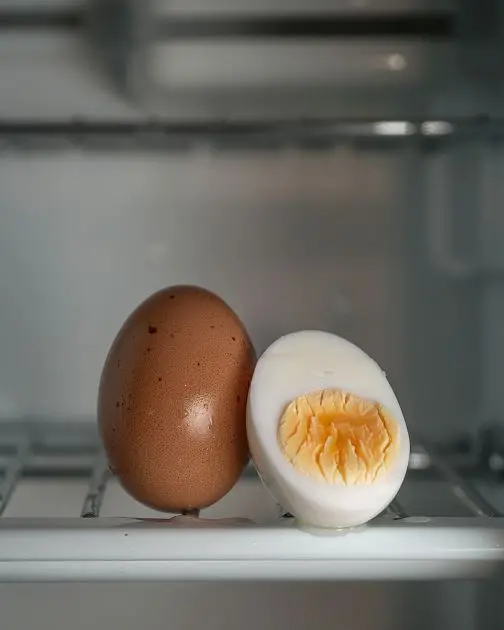Eggs are a kitchen staple around the world—easy to prepare, packed with nutrients, and incredibly versatile. Among the many ways to enjoy them, hard-boiled eggs stand out for their simplicity and shelf life. But one question often sparks debate in home kitchens: Should you peel hard-boiled eggs before storing them in the refrigerator?
While it may seem like a minor detail, the choice to peel or not to peel can impact flavor, texture, food safety, and longevity. In this guide, we’ll break down the pros and cons of each method, give you smart storage tips, and answer common questions so you can store your hard-boiled eggs confidently and safely.
Why Proper Egg Storage Matters
Eggs are perishable and sensitive to temperature and handling. Once cooked, hard-boiled eggs are more vulnerable to bacterial contamination, especially if their protective shell is removed. Storing them correctly is crucial for keeping them fresh, flavorful, and safe to eat.
Even if you’re boiling eggs for snacks, salads, or meal prep, the way you store them afterward can make a surprising difference.
Understanding the Shell’s Role
Natural Protection
The eggshell acts as a natural barrier against moisture loss and bacteria. It helps preserve freshness by keeping the inside of the egg insulated from the air and fridge odors.
Texture and Odor
Keeping the shell on helps maintain the egg’s firm texture and prevents it from absorbing strong smells from the refrigerator (like onions, garlic, or cooked meats).
Unpeeled vs. Peeled: Which Is Better?
Let’s break it down:
Unpeeled Hard-Boiled Eggs
- Shelf Life: Up to 1 week in the fridge
- Protection: The shell prevents drying out and bacterial growth
- Flavor Preservation: Less likely to absorb fridge odors
- Downside: Slightly less convenient if you’re in a rush or meal prepping
Peeled Hard-Boiled Eggs
- Shelf Life: Best consumed within 2–3 days
- Convenience: Ready to eat, ideal for quick snacks or lunchboxes
- Storage Needs: Must be kept in an airtight container or submerged in water
- Risk: Higher chance of contamination without the shell
How to Store Hard-Boiled Eggs Properly
If Storing Unpeeled Eggs
- Cool Quickly: After boiling, place eggs in an ice bath to stop cooking and cool rapidly.
- Dry Thoroughly: Pat dry before refrigerating.
- Use a Covered Container: Store them in an airtight container to prevent moisture loss and odor transfer.
- Label: Write the boil date on the container to keep track.
If Storing Peeled Eggs
- Peel After Cooling: Let eggs cool fully before peeling to prevent tearing.
- Use Cold Water or Airtight Storage:
- Option A: Place in a bowl of cold water (change water daily).
- Option B: Store in an airtight container lined with a damp paper towel.
- Refrigerate Immediately: Don’t leave peeled eggs out—store them in the fridge right away.
- Consume Promptly: Eat within 48–72 hours for best taste and safety.
Best Practices for Hard-Boiled Egg Storage
- Refrigerate within 2 hours of boiling.
- Keep fridge temperature below 40°F (4°C).
- Avoid freezing hard-boiled eggs; whites become rubbery.
- Sniff and inspect eggs before use. Discard if there’s a sour smell or slimy texture.
Tips to Keep Hard-Boiled Eggs Fresh
- Use older eggs for boiling. They peel easier than fresh ones.
- Label storage containers with dates for quick tracking.
- Don’t mix peeled and unpeeled eggs in the same container. Moisture and exposure can affect the unpeeled ones.
- Don’t store in the egg carton. Use a sealed container to limit odor absorption and bacteria transfer.
Meal Prep Hacks
- Batch-boil on Sunday for the week ahead.
- Store a mix of peeled (for quick eats) and unpeeled (for later use).
- Use peeled eggs within 3 days, and unpeeled ones within a week.
This method helps balance convenience and safety.
Conclusion: Peel or Not to Peel?
The answer depends on your needs and habits:
- For maximum shelf life and food safety, keep eggs unpeeled.
- For meal prep and daily convenience, peel—but store carefully and eat within a few days.
No matter which route you take, make sure your fridge is clean and cold, and always store hard-boiled eggs in a sealed container. When in doubt—smell, inspect, and don’t risk it.
FAQs
How long do unpeeled hard-boiled eggs last in the fridge?
Unpeeled eggs can safely last up to one week when stored properly in the refrigerator.
What’s the best way to store peeled eggs?
Place them in an airtight container lined with a damp paper towel or submerge them in cold water. Change the water daily and eat within 2–3 days.
Can you freeze hard-boiled eggs?
It’s not recommended. Freezing changes the texture, especially of the whites, making them rubbery and unpleasant.
How do you know if a hard-boiled egg has gone bad?
Check for an off smell, slimy surface, or unusual color. If in doubt, throw it out.
Is it safe to boil eggs in advance for the week?
Yes! Just be sure to store them properly. Unpeeled eggs are best for long-term use, while peeled ones should be used quickly.
Can I peel hard-boiled eggs the night before?
Absolutely. Store them in a sealed container and consume within 2–3 days for best results.

